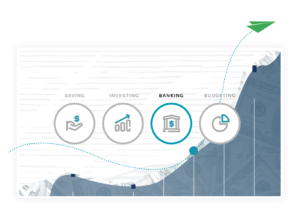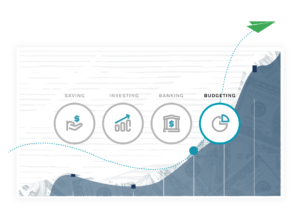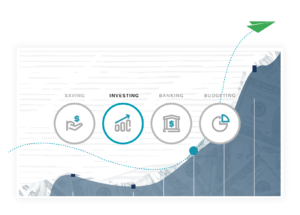Details Are Part of Our Difference
Embracing the Evidence at Anheuser-Busch – Mid 1980s
529 Best Practices
David Booth on How to Choose an Advisor
The One Minute Audio Clip You Need to Hear
Author: Charles Kafoglis
Compounding Wisdom: Banking 101

This is the latest in our series of introductory “101” financial guides. Each guide reveals a set of wise actions as well as a set of behaviors to avoid. The goal? Help you make smart choices at every turn in your financial road trip. We have seen financial successes exponentially enhanced when wise financial decisions are made repeatedly over a long period. This month’s focus is Banking. Online banking, online banks, and fintech firms are rapidly changing the competitive landscape, so staying up to date can be challenging.
Compound Wisdom Actions
- Good Things Come in Threes – A great start is 1 checking account, 1 savings account for your emergency fund, and 1 savings account for near-term large purchases.
- Know the Fine Print – Understand the fees within your account and how to avoid them.
- Don’t Live on the Edge – Keep a cushion in your checking account to avoid overdrafts.
- Know Where You Stand – With smartphone access and reduced use of checks, it’s easy to know your real balance and there is less need to “balance your checkbook” each month.
- Hold On – Plan ahead so you aren’t surprised when a deposit is placed on hold and the funds are not instantly available.
- Stay Alert – Review your account’s balance and transaction alert settings and update them to match your preferences.
- Stay Safe – Enable two-factor authentication, and never access your bank app on public Wi-Fi.
- Go on Auto-Pilot – Use your checking account as a hub to auto-pay your bills instead of a credit card (which may be reissued every time fraud is suspected).
- Get the Kids Involved – A savings account for a child in middle school can be a great tool to start them off in learning about banking.
- Don’t Simply Pass it Along – Young adults should investigate the low-cost nature of online banks and not just adopt their parent’s brick-and-mortar bank.
- No Interest – While the national banks continue to offer low-interest rates on checking accounts, many online banks pay cashback when you use their debit card, making it a potentially wise choice for younger adults.
Behaviors to Avoid:
- Over-drafting Often – Regular overdrafts signal you are not in control of your finances.
- Surprise, Surprise – Not knowing your balance weekly or even daily can result in a costly surprise.
- Banking Inertia – If your bank is assessing fees or delivering poor service, pull the plug and find a better solution.
- Paying Avoidable Fees – If you are being assessed fees each month, you should ask how to eliminate them.
- Walking Around with Your Emergency Fund – Never use your checking account as a place to save for emergencies – create a dedicated savings account that is less easy to access (aka no debit card).
Feel free to pass this along if you know someone who might benefit from the guidance and look for more from me in this monthly series.
I lead our Hillfolio level client service and planning efforts, learn more about me here and reach out if I can help you put the magic of compounding on your side.
Compounding Wisdom: Budgeting 101

This is the latest in our series of introductory “101” financial guides. Each guide reveals a set of wise actions as well as a set of behaviors to avoid. The goal? Help you make smart choices at every turn in your financial road trip. Your financial success will be exponentially enhanced when you make wise financial decisions repeatedly over a long period. This month’s focus is Budgeting, the center of your financial plan.
Compounding Wisdom: Budgeting
Compound Wisdom Actions
- Write it down – a budget is a formal, written monthly plan for your money, developed before you spend it.
- Liberate yourself – eliminate the guilt that comes with spending, knowing it was all part of the plan.
- Be patient – it takes three or four months of budgeting experience to feel confident in your plan.
- Toss the straitjacket – plan for fun, so your budget expands and doesn’t constrict your life.
- Keep it balanced – plan for all your needs, enough of your wants, and most of your savings.
- No leftovers – a zero-based budget accounts for every dollar of income, spending, and savings.
- Every dollar has a name – each dollar is either spent or saved and is assigned a category.
- Keep it simple – create a great budget with less than 20-30 categories.
- Keep track – track actual spending so you can adjust your plan for the next month as you improve.
- Minimize marital stress – it’s much easier to discuss money before it’s spent rather than after.
- Set it and forget it – using an automated tool is a painless way to plan and track your money.
Actions to Avoid
- Failing to plan is planning to fail – Don’t procrastinate; jump in, and start a monthly plan today.
- Too needy – don’t limit your budget to just the necessities – plan for family fun and relaxation too.
- What happened? – the plan has limited value if you don’t track your actual results and evaluate the plan each month or so.
- Cast it in stone – don’t treat your budget as a “read-only” document – update it often as life changes.
- Give up too soon – financial planning gets easier over time, but you must get through those first few months of learning and developing your plan.
- Mind the gap – don’t forget about planning for emergencies, gifts, vacations, large purchases, kid’s activities, and all those non-recurring one-off expenses.
Feel free to pass this along if you know someone who might benefit from the guidance and look for more from me in this monthly series.
I lead our Hillfolio level client service and planning efforts, learn more about me here and reach out if I can help you put the magic of compounding on your side.
Compounding Wisdom: Investing 101

I taught personal finance and leadership at the high school level for over twelve years. One of my favorite concepts I loved to communicate was the magic of compounding. Although great financial value is derived by recognizing the wisdom of compounding, I believe there is even greater value in recognizing the compounding of wisdom.
Could your financial success be exponentially enhanced by making wise financial decisions repeatedly over a long period?
In the months ahead, I’ll share important ideas I’ve seen result in positive financial outcomes, and give you the roadmap. The goal? Help you make wise choices at every turn in your own financial road trip. Think of it as an introductory – or “101” – guide to compounding financial wisdom.
Compounding Wisdom on Investing:
Compound Wisdom Actions
- Pay yourself first – invest every time you get paid, even if the amounts seem small, through automatic transfers to either your 401k/403b or personal accounts.
- Stretch to invest – target 15%-25% of your income to save or invest each year.
- Diversify – spread your investments across multiple asset classes to manage risk.
- Leave nothing on the table – make sure you receive the full match your company offers.
- Look out for Roth – consider the Roth 401(k) option if available in your employer plan.
- Control for fees – you can’t control returns, but you can control investment fees by investing in low-cost funds.
- Keep emotions in check – you invest for the long term, so resist the urge to trade urgently, or time the market.
- Rebalance – keep your investment allocation in balance across asset classes.
- Harvest your losses – take advantage of down markets to accumulate valuable capital losses.
- Be aggressive – as a young adult, don’t fear an allocation that is dominated by equities.
- Look under the covers – many target date funds are costly and may not be appropriately allocated.
- DIY is difficult – work with an advisor who always works in your best interest (also known as a Fiduciary).
Actions to Avoid
- Waiting to get started – your most valuable dollar invested is your first.
- Failing to sign up for employer retirement plan – start the first month you are eligible.
- Failing to earn the entire match – one of the only free lunches around.
- Investing in mutual funds with high fees – don’t be seduced by sexy short-term returns that are unlikely to persist.
- Paying penalties – don’t incur penalties by withdrawing from retirement accounts early.
- Abandoning your plan – don’t get sucked into the latest “can’t miss” stock recommendation you hear online or from a friend.
- Timing the market – invest regularly or whenever you can, as early as you can.
- Loving your company too much – monitor the risk you may incur from owning too much company stock.
Feel free to pass this along if you know someone who might benefit from the guidance and look for more from me in this monthly series.
I lead our Hillfolio level client service and planning efforts, learn more about me here and reach out if I can help you put the magic of compounding on your side.

